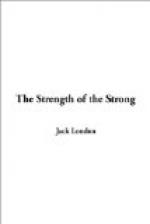It was while gathering material for Women and Work that Freddie received his first warning of the danger he was in. He was too successful at living in both worlds. This strange dualism he had developed was after all very unstable, and, as he sat in his study and meditated, he saw that it could not endure. It was really a transition stage, and if he persisted he saw that he would inevitably have to drop one world or the other. He could not continue in both. And as he looked at the row of volumes that graced the upper shelf of his revolving book-case, his volumes, beginning with his Thesis and ending with Women and Work, he decided that that was the world he would hold to and stick by. Bill Totts had served his purpose, but he had become a too dangerous accomplice. Bill Totts would have to cease.
Freddie Drummond’s fright was due to Mary Condon, President of the International Glove Workers’ Union No. 974. He had seen her, first, from the spectators’ gallery, at the annual convention of the Northwest Federation of Labour, and he had seen her through Bill Totts’ eyes, and that individual had been most favourably impressed by her. She was not Freddie Drummond’s sort at all. What if she were a royal-bodied woman, graceful and sinewy as a panther, with amazing black eyes that could fill with fire or laughter-love, as the mood might dictate? He detested women with a too exuberant vitality and a lack of . . . well, of inhibition. Freddie Drummond accepted the doctrine of evolution because it was quite universally accepted by college men, and he flatly believed that man had climbed up the ladder of life out of the weltering muck and mess of lower and monstrous organic things. But he was a trifle ashamed of this genealogy, and preferred not to think of it. Wherefore, probably, he practised his iron inhibition and preached it to others, and preferred women of his own type, who could shake free of this bestial and regrettable ancestral line and by discipline and control emphasize the wideness of the gulf that separated them from what their dim forbears had been.




